Who needs muscle strengthening exercises?
Introduction
There are many reasons people lose muscle strength. People lose muscle strength as they get older or when they have health conditions or injuries that limit their mobility. People that are less active because of illness or lifestyle will also lose muscle strength.
To prevent or reverse muscle weakness the World Health Organization recommends that all adults should do muscle strengthening activities at moderate or greater intensity that involve all major muscle groups on 2 or more days a week, for substantial health benefits.
This topic covers some common presentations and conditions where people may have reduced muscle strength and will benefit from muscle strengthening exercises.Painful joints
If a person has painful joints, muscle strengthening can be very helpful.
Strong muscles supporting the joint can help
- Make the joint more stable
- Reduce pressure in the joint and reduce pain
![]() Question
Question

Meet Julie
Julie is 69 years old and plays badminton three times a week. Julie developed a painful left knee and was not able to play a full game. After a few months her left knee pain got worse and she had to stop playing. Julie went to see her doctor and was told she had osteoarthritis in both of her knees. Julie’s left knee pain has continued to get worse and she has been nervous about exercising since she found out she has osteoarthritis in her knees.
Muscle strengthening may help to support Julie’s joints and reduce her pain.
Select all that apply.
- a. True
- b. False
If you selected a, you are correct.
Muscle strengthening will support Julie’s knee joint and reduce pain. Exercise, including muscle strengthening, is the most effective, non-pharmaceutical treatment for reducing pain and improving movement for people with osteoarthritis.
Exercise, including muscle strengthening, is the most effective, non-pharmaceutical treatment for reducing pain and improving movement for people with osteoarthritis.
Weakness and poor posture due to neurological health conditions
People who have a neurological health condition or have experienced a neurological health event will often experience muscle weakness, reduced function, poor posture and poor balance due to neurological impairment of motor control.
Muscle strengthening exercises can help to:
- Stimulate motor pathways
- Regain muscle control
- Regain sitting and standing balance
- Improve posture
- Regain function
Other factors, such as shoulder joint subluxation, reduced joint range of motion and postural support also need to be considered when performing muscle strengthening exercises with a person who has a neurological condition.
![]() Question
Question
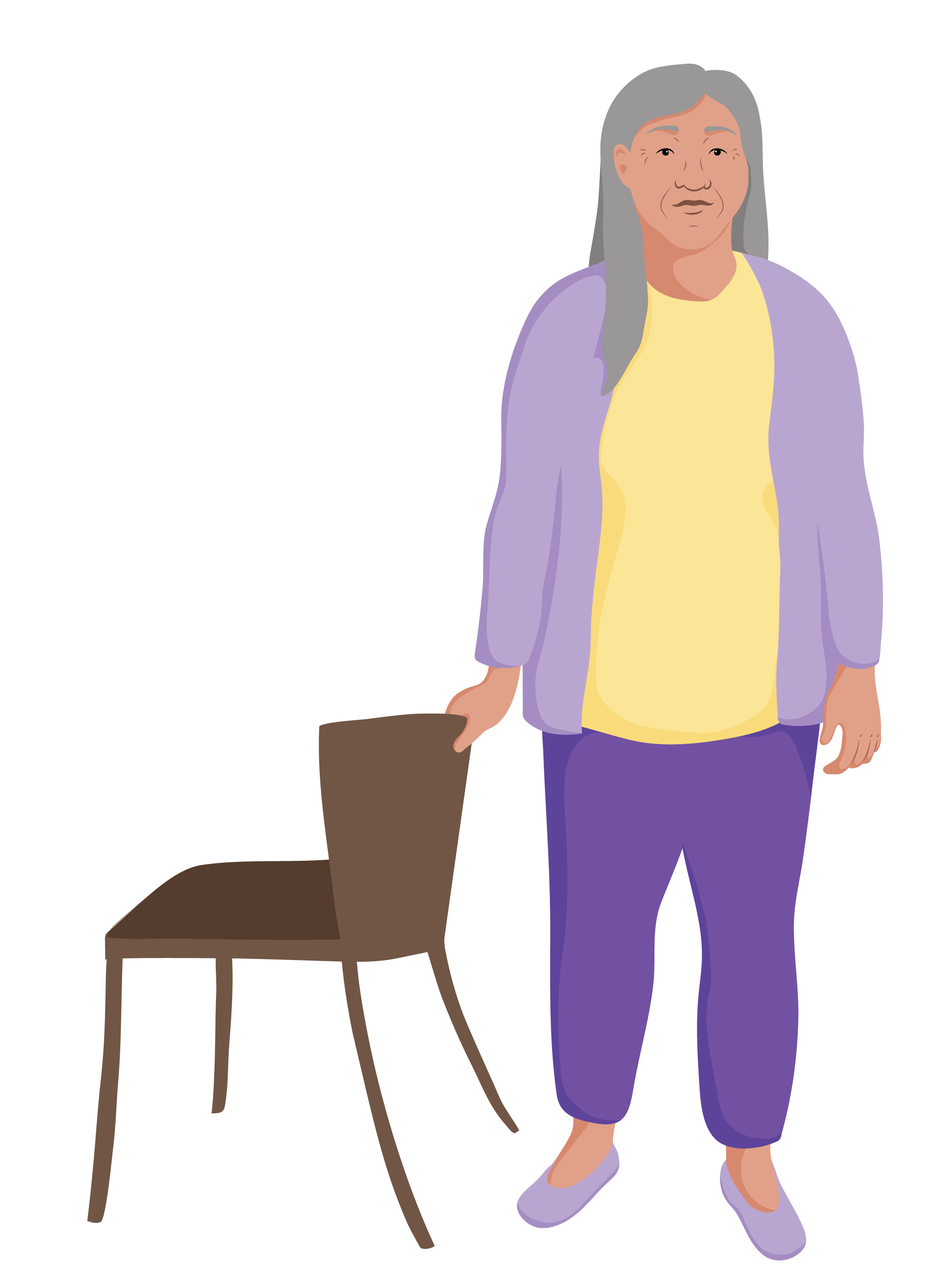
Meet Nguyen
Nguyen is 62 years old and lives with her husband and pet Labrador.
Nguyen had a mild stroke resulting in weakness in her left arm and leg.
Nguyen is still very active in her community and very fit. She is president of her local community group that assists with delivering meals to the homeless.
Nguyen has not been able to do her duties as president since her stroke, due to the weakness in her left arm and leg and reduced balance. She occasionally uses a walking stick but would like to improve her balance so that she does not need to use it.
Do you think muscle strengthening exercises may be appropriate for Nguyen?
- a. Yes
- b. No
If you selected a, you are correct.
Based on the available information, muscle strengthening may be appropriate for Nguyen.
Based on the available information, which areas should muscle strengthening aim to improve for Nguyen?
Select all that apply.
- a. Left arm
- b. Left leg
- c. Balance
All are correct.
Based on the information and, all of these areas should be targeted when assessing muscle strength and then muscle strengthening exercises should be planned based on assessment findings.
Recovering from acute injuries or surgery
Anyone who is recovering from an acute injury or surgery will experience muscle wasting and muscle weakness in the area around the injury or surgical site. The longer the person is unable to move a body part or their body at full capacity, the more muscle wasting and weakness that will occur.
Muscle strengthening can help people recovering from injury or surgery by:
- Regaining movement and strength
- Reducing pain and stiffness
- Stimulating blood flow
- Promotion of wound healing
![]() Question
Question

Meet Farah
Farah is a 22-year-old female. Farah is from a small rural village, but lives most of the year in the city, studying an engineering degree at university.
In a rush to get to class, she tripped down some stairs at university and fell on her arm, fracturing her wrist.
Farah spent 6 weeks in a cast and was told by the university doctor to see a doctor at home after she gets after her cast taken off during the university holidays.
Farah comes to see you after having her cast removed. She could not move her hand a lot when she was in the cast and is now experiencing pain when she moves her wrist and hand, causing her to be afraid of moving it.
Will muscle strengthening exercises be beneficial in this situation?
- a. Yes
- b. No
If you selected a, you are correct.
Muscle strengthening exercises combined with range of motion exercises and manual treatment for the wrist and hand will be beneficial to promote movement in Farah’s wrist in this situation.
Chronic injury
Chronic injury can lead to muscle weakness, fear or avoidance of movement, recruitment of incorrect muscles when moving and decreased mood and depression associated with prolonged periods of pain making it difficult to work or do things they enjoy.
Muscle strengthening can help people with chronic injuries to:
- Improve strength
- Improve movement patterns and recruit more appropriate muscles
- Reduce pain
- Improve mood and self esteem
- Contribute to people being able to return to work or doing activities they enjoy.
![]() Question
Question
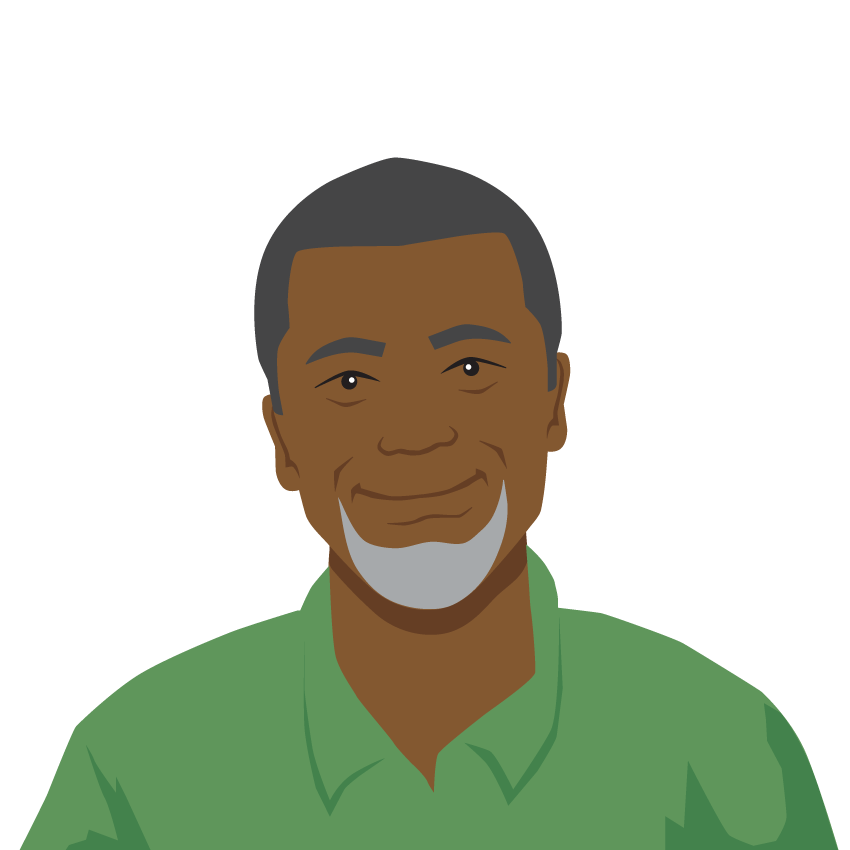
Meet Lionel
Lionel is 52 years old. He lives with his wife and two children aged 19 and 22.
Lionel works for his local council and sits for most of the day at work. Lionel has been experiencing low back pain for 10-12 years, he has tried many different things to reduce his pain without any success.
Before he started having back pain, Lionel used to love riding his bike with his kids and making things using woodwork, but now finds he cannot do those activities without aggravating his back pain.
You have recommended that Lionel try muscle strengthening exercises to try and reduce his back pain.
Lionel hasn’t done muscle strengthening exercises before and asks what the benefits would be for him.
Lionel hasn’t done muscle strengthening exercises before and asks what the benefits would be for him.
Which of the following may be benefits of muscle strengthening for Lionel?
Select all that apply.
- a. Reduce his low back pain
- b. Assist him to ride his bike without aggravating his lower back pain
- c. Help to strengthen the muscles that will enable him to do woodwork without aggravating his back pain
All are correct.
All of these options may be benefits of muscle strengthening for Lionel.
For Lionel and everyone else who you plan muscle strengthening exercises for, you should try to focus on the activities that person enjoys doing or needs to be able to do and work with them to set goals based on these activities.
Improve heart health
Muscle strengthening can help to improve heart health and in so doing:
- Reduces fatigue
- Reduces blood pressure
- Manages weight
- Increases the levels of good cholesterol and decreases levels of bad cholesterol
![]() Question
Question
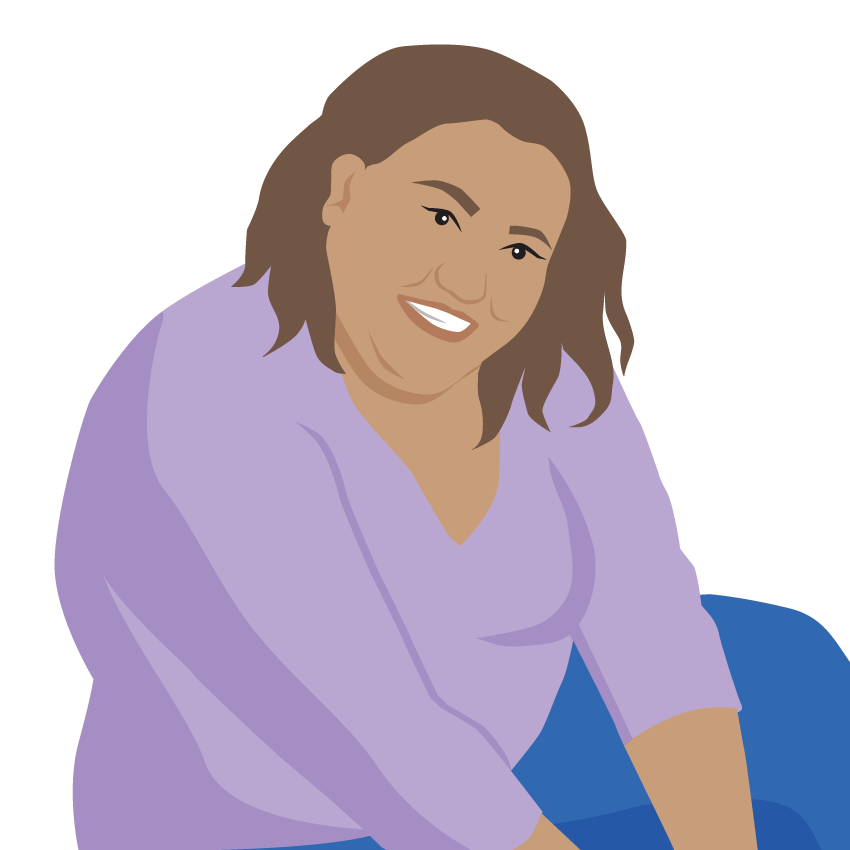
Meet Gabriella
Gabriella is 48 years old and lives with her husband and two children. She runs a flower stall in the market in the town where she lives.
After becoming increasingly short of breath and noticing an elevated heart rate doing small tasks at the flower shop, Gabriella went to see her doctor.
After seeing her doctor, Gabriella was diagnosed with ischemic heart disease.
Since her diagnosis, Gabriella mood has decreased and although she used to walk once a week with friends, she does not like to go walking with her friends anymore due to her shortness of breath and fatigue.
As Gabriella’s doctor or nurse, do you think muscle strengthening exercises could be appropriate for Gabriella?
- a. Yes
- b. No
If you selected a, you are correct.
Muscle strengthening exercises could be appropriate for Gabriella.
People with shortness of breath or who are easily fatigued
Muscle strengthening exercises can help to:
- Improve the strength of the muscles that help to breathe
- Reduce shortness of breath over a period of time
- Reduce fatigue and allow people to carry out activities for longer
Meet Sachin
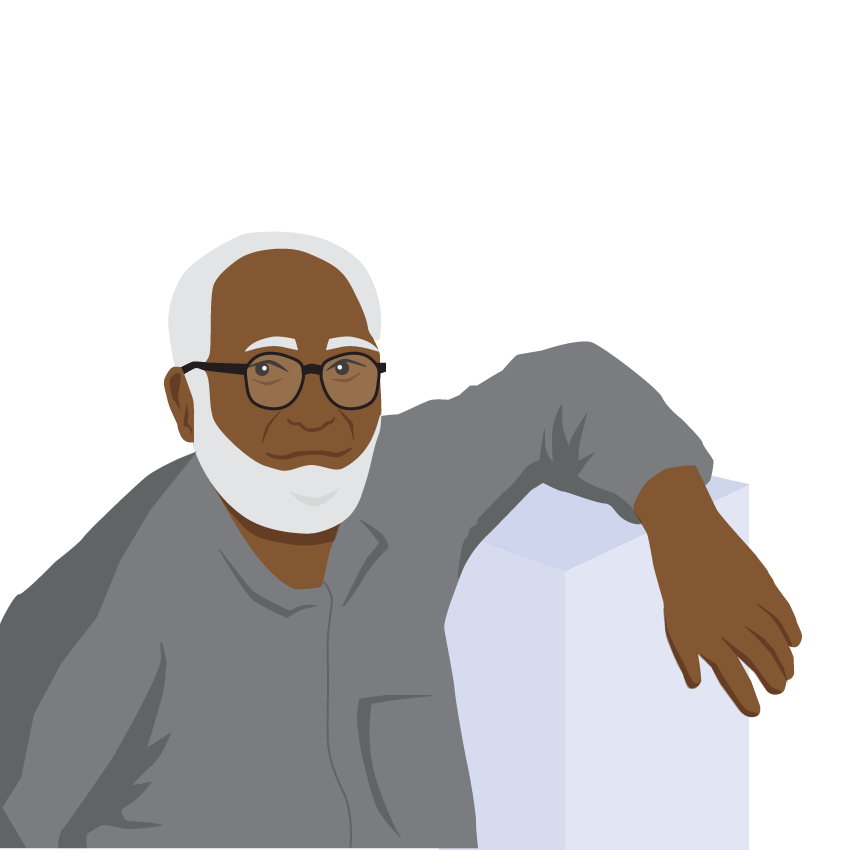
Sachin is 52 years old. He lives with his partner and has two grown up sons and one grown up daughter.
For a long time, Sachin worked in a sawmill. The dust and particles in the air during his work at the sawmill may have contributed to Sachin being diagnosed with chronic obstructive pulmonary disease (COPD). Sachin now works in his son’s fruit and vegetable store, however recently he has had to reduce his hours because he has been feeling increasingly short of breath and fatigued.
Six months ago, Sachin’s doctor taught him and his son, Solomon, strengthening exercises to do at home.
Since doing the muscle strengthening exercises, Sachin is feeling less short of breath and fatigued and has been able to slightly increase his hours at his son’s store. This makes him very happy.Frail/old age
Muscle strengthening exercises can help older people by:
- Improving their ability to perform everyday activities by strengthening muscles used in those activities
- Improving balance and decrease risk of falling when mobilising
- Helping to prevent cognitive decline associated with ageing
- Improving self-esteem and self confidence
- Improving mood and mental health
![]() Question
Question
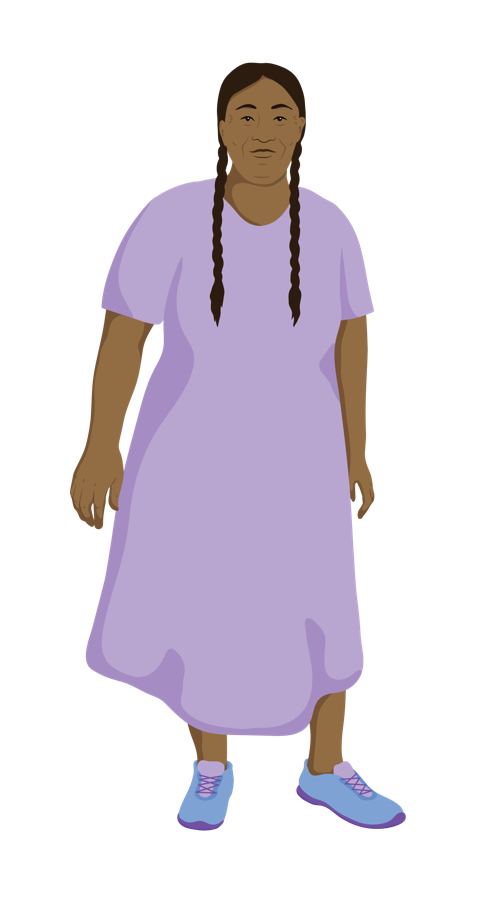
Meet Sofia
Sofia is 68 years old. Sofia lives with her husband, Michael. Sofia uses a walking stick to mobilise as she has poor balance. Since receiving the walking stick has felt a lot more confident mobilizing, but she would like to improve her balance so that she feels confident without it. Sofia enjoys gardening but has not been able to join Michael in the garden recently as she feels unsteady.
Sofia presents to your clinic having fallen twice in the past six months, she hasn’t done any muscle strengthening exercises or any exercise at all for many years.
What are the benefits of muscle strengthening for Sofia?
Select all that apply.
- a. Improved balance
- b. Contribute to bone strength
- c. May prevent cognitive decline
All are correct.
All of the options above are benefits of muscle strengthening for older or frail people.
Type II diabetes
Muscle strengthening can help people with type II diabetes by:
- Controlling blood sugar levels
- Improving muscles’ ability to store glycogen
- Lowering blood pressure
- Helping to manage weight
![]() Question
Question
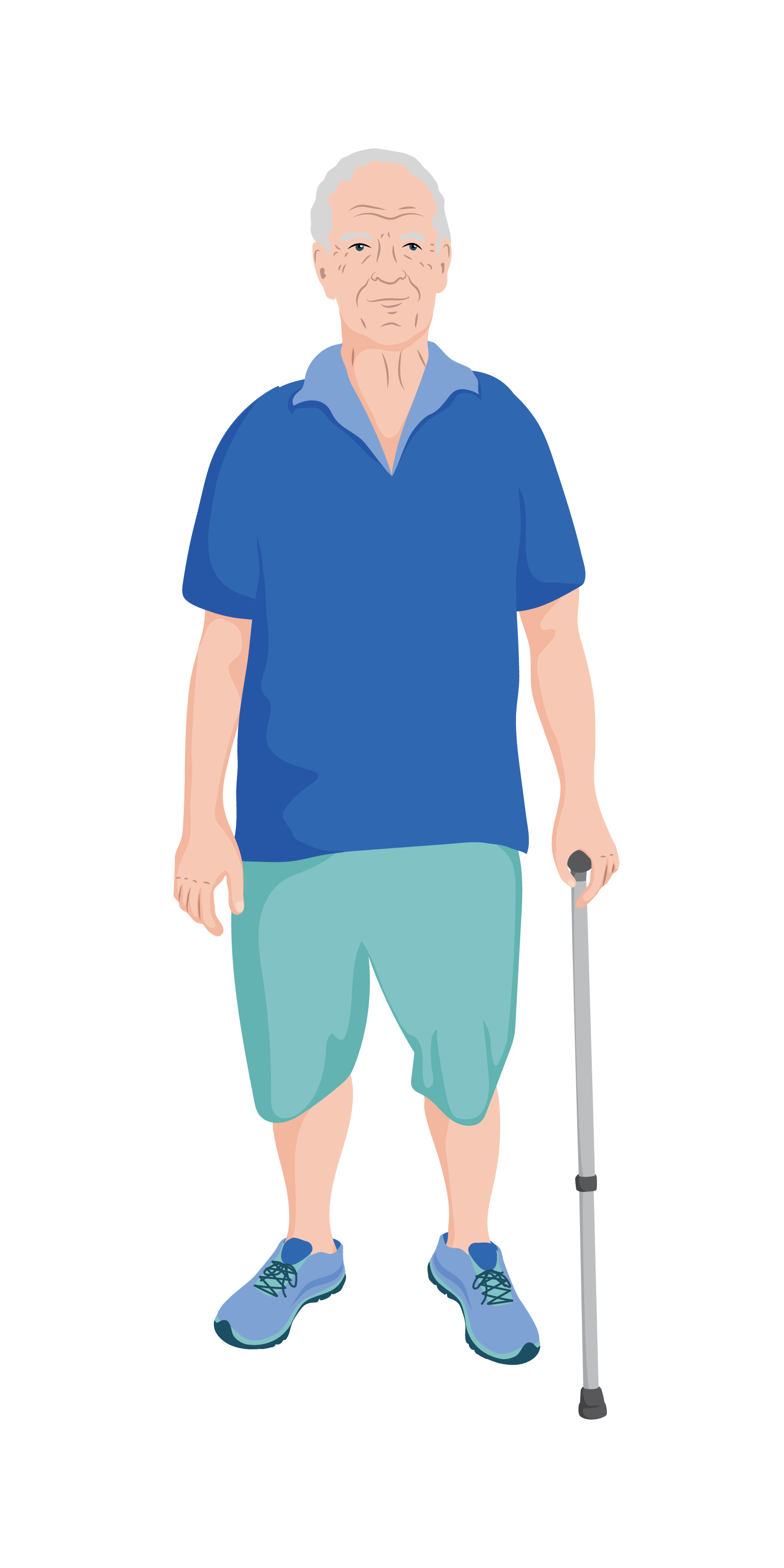
Meet Jensen
Jensen is 43 years old and is a computer and cyber security specialist. He lives with his partner and their two children, aged 9 and 11.
Due to his long work hours and commitment to his job, Jensen lead a sedentary lifestyle for a number of years before eventually being diagnosed with type II diabetes.
Jensen recently had a diabetic foot wound, after receiving treatment for this, he has taken good care of his diabetes.
He walks daily to help manage his weight and stay active. As his clinician, you suggest that muscle strengthening exercises could also be beneficial for him. Jensen asks what the benefits of muscle strengthening could be for him?
Which of the following could be benefits of muscle strengthening exercises for Jensen?
Select all that apply.
- a. Muscles get bigger and stronger and become better at storing glycogen, reducing blood sugar levels
- b. Contribute to managing and losing weight
- c. Lowers the risk of diabetes complications by lowering blood pressure
All are correct.
All of the options above are benefits of muscle strengthening for people with type 2 diabetes.
Summary – benefits of muscle strengthening exercises
Muscle strengthening has many benefits for physical and mental health.t
![]() Question
Question
Look at the benefits of muscle strengthening exercises.
Which of these are important for a person’s mental wellbeing?
Select all that apply.
- a. Protect a person’s joints
- b. Help a person to keep moving and carry out their daily activities
- c. Improve balance and help a person remain independent
- d. Reduce a person’s weight
- e. Improve brain health by reducing confusion and memory loss
- f. Help a person to do more before they get tired by improving muscle endurance
- g. Help trigger release of happy hormones into the body, which helps reduce worries and depression.
- h. Can help prevent or control chronic health conditions
If you selected e, and g, you are correct.
These options directly help a person’s mental wellbeing.
Options a, b, c, d, f, and h, are physical benefits of muscle strengthening but all of these will also help a person’s emotional wellbeing by helping them be more active in their family and/or community and/or work life.
